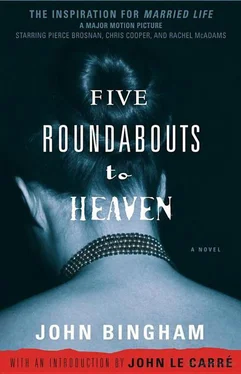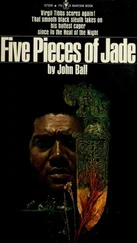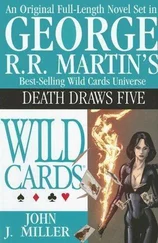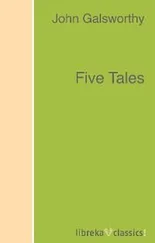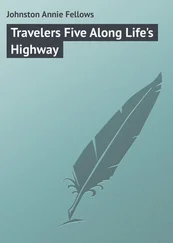John Bingham - Five Roundabouts to Heaven
Здесь есть возможность читать онлайн «John Bingham - Five Roundabouts to Heaven» весь текст электронной книги совершенно бесплатно (целиком полную версию без сокращений). В некоторых случаях можно слушать аудио, скачать через торрент в формате fb2 и присутствует краткое содержание. Жанр: Криминальный детектив, на английском языке. Описание произведения, (предисловие) а так же отзывы посетителей доступны на портале библиотеки ЛибКат.
- Название:Five Roundabouts to Heaven
- Автор:
- Жанр:
- Год:неизвестен
- ISBN:нет данных
- Рейтинг книги:4 / 5. Голосов: 1
-
Избранное:Добавить в избранное
- Отзывы:
-
Ваша оценка:
- 80
- 1
- 2
- 3
- 4
- 5
Five Roundabouts to Heaven: краткое содержание, описание и аннотация
Предлагаем к чтению аннотацию, описание, краткое содержание или предисловие (зависит от того, что написал сам автор книги «Five Roundabouts to Heaven»). Если вы не нашли необходимую информацию о книге — напишите в комментариях, мы постараемся отыскать её.
Five Roundabouts to Heaven — читать онлайн бесплатно полную книгу (весь текст) целиком
Ниже представлен текст книги, разбитый по страницам. Система сохранения места последней прочитанной страницы, позволяет с удобством читать онлайн бесплатно книгу «Five Roundabouts to Heaven», без необходимости каждый раз заново искать на чём Вы остановились. Поставьте закладку, и сможете в любой момент перейти на страницу, на которой закончили чтение.
Интервал:
Закладка:
Indeed, I saw no mercy for him at all, but only the seas of panic, and the long dark years in the long grey corridors; and the sense of the loss of Lorna Dickson; and the burden of the knowledge of failure.
I lit a cigarette and considered the practical side of the matter. I told myself that Bartels was a fool, and I was even more of a fool to risk disgrace and punishment for his sake.
Nevertheless, I fetched the altrapeine bottle and made my plans. They were simple enough.
I went to the hospital in the late afternoon of the following day, as the light was fading. The sister in charge informed me that Bartels had had a restless night, but that failing a sudden relapse his chance of recovery was reasonable.
The same detective was on duty, and he greeted me with a curt nod. I knew that this man was an antagonist, that I had to be careful of him, but I felt cool enough, and I held, in my left hand, the small flat paper packet, open at one end, so that its contents would slide forth easily.
I would like to be able to record that my last talk with Philip Bartels had a hidden drama unperceived by the detective with his mackintosh and his horrible notebook, and chewed pencil, and his hard, alert eyes, and his slightly protruding ears; that it contained obscure phrases of significance to both of us.
Such was not the case.
I sat by the side of his bed, on a hard chair.
“How are you feeling?” I asked.
He nodded and smiled. “I’ve felt worse.”
“Is there anything you want, Barty? Fruit? Can you eat fruit?”
“Not yet,” he murmured. “No fruit yet.”
“Are they treating you well?”
“Quite well,” he murmured.
“It’s still bitterly cold outside,” I said. He nodded.
“And Beatrice?” he asked softly.
“I’ve not seen Beatrice yet. Her mother has come up.”
“Have any of the others heard?”
“Nobody,” I said. “Nobody at all.”
He seemed content, and closed his eyes for a while. The detective put his notebook down and relaxed. A gust of wind blew against the windows and rattled them, and the sound caused Bartels to open his eyes.
He said nothing, but held my eyes with his own. The detective, now that the conversation had lapsed, sat picking at a button on his mackintosh, inattentive and bored.
I had to know whether Bartels had changed his mind, and raised my eyebrows in silent question. Because of his short sight, I doubt if he saw, but he smiled slightly and nodded. He looked peaceful and contented, like a child who, after lamentations and protests, is now tucked up in bed and warm and reconciled. Indeed, he looked happier at that moment than I had seen him look for months. It was as though all his personal problems were resolved. Having no future he had no worries. He was about to leave the world, which had proved too much for him, and he was not sorry.
He raised his hand to his forehead, and then carelessly placed it near the side table, the forefinger pointing, as if by chance, to the plastic tumbler, containing water.
Now, for the first time, I felt tense and keyed up, I knew that Bartels would make the opening gambit, and that I would have to follow.
It came quite suddenly:
“Pete?”
“Yes,” I said, and saw the detective begin to pay attention again.
“Could you get me a little more water out of the tap?”
I got up and took the plastic tumbler. It was still half-full, and although the light in the room was heavily shaded, I placed my hand round the tumbler lest the detective should see the level of the water through the thin material.
I walked over to the handbasin and ran the water for a moment, keeping my left hand on the tap. I ran a little water into the mug, and tipped my left hand so that the white powder flowed into the mug.
I turned off the tap, and walked back to the bed.
“Are you sure you want a drink, Barty?”
He nodded. “If you don’t mind. I’m so sorry to trouble you,” he added. He put out his hand for the mug, but I shook my head.
“Let me hold it for you,” I said. I raised his head with my left hand, and put the tumbler to his lips. I was conscious of hearing the detective speak. I heard him above the beating of my heart, and was irritated; he said something about Bartels not being supposed to drink too much.
Bartels emptied the tumbler.
I said: “I’ll refill it, in case you need some more later.” I rinsed out the receptacle, twice, added some water, and replaced it on the side table.
“You shouldn’t let him drink all that,” said the detective peevishly.
“No,” I said. “No, perhaps I was wrong.”
Bartels looked up at me from his pillow. He said:
“I think perhaps you had better go, Pete. Thanks for everything. I feel a little tired. I think I’ll sleep.”
I stood up and looked down at him.
“Well, so long, Barty,” I said. “Good luck.”
He said nothing more, but lay with his eyes closed.
“Visits tire him,” said the detective, pulling a cheap, paperbacked edition of some novel from his mackintosh pocket and beginning to read. I doubt if he even saw Bartels die.
First I heard the sound of the Americans’ car on the distant Orleans-Blois highway, then the engine noise died away as it slowed to turn into the poplar drive, then the sound increased as it accelerated up the drive.
I could not see it at first, because the chateau lay between me and the drive, but eventually I saw the light from the headlamps reflected from the trees at the side of the house, and then, once again, there was only the soft moonlight.
I slipped deeper into the wood, and walked softly along the path which led past the chateau, and past the ruined tennis courts. Behind me I heard men talking and a woman laugh. I walked more quickly, and once, as something stirred in the undergrowth by the side of the path, I felt the gooseflesh again run over my skin.
I rounded each bend in the path with a conscious effort, each time afraid lest I should see before me a figure on the path. The sweet, nostalgic melancholy of the sunset hours had departed, and loneliness and apprehension had taken its place.
I wanted no more of the chateau, and knew that I would never visit it again. I had thought that it would hold for me nothing but the tender memories of youthful happiness, that here Bartels and I, and Beatrice, and Ingrid, and all the rest of that cheerful crowd could meet within the compass of my mind, and be reunited for an hour or so, and talk and walk and laugh and love as we had done in the days gone by.
But it didn’t work out that way.
Fear became mixed with the joy, and remorse and self-reproach stretched out their long, strong fingers and smeared the images. I suppose there is always that risk if you revisit a place where you think you can regain for a while your earlier rapture.
Moreover, one small doubt remained unresolved.
I thought of it as I made my way along the side of the drive, and to where my car stood, its sidelights unlit, a menace to all on the highway.
I thought of it as I drove back to Orleans, and again later, when they asked me whether I had enjoyed “my sentimental journey,” as they called it.
I said I had, of course, though the doubt still nagged at me, and they laughed indulgently. Only Lorna, dear Lorna, my wife, did not laugh, did not even smile; for Lorna had advised me not to go.
My doubt is, I suppose, a case of scruples.
It is due to the fact that as I held the tumbler to Bartels’ lips, and watched him drink, a thought flashed through my mind which I tried instantly to repress.
The thought was: He’ll never kiss her with those lips again. She’s safe now, beyond all risk or doubt: she’s mine.
I wish the thought had never occurred to me. But it cannot be helped now. I am, as I have indicated, a worldly type, little prone to introspection. The memory of that thought will grow fainter.
Читать дальшеИнтервал:
Закладка:
Похожие книги на «Five Roundabouts to Heaven»
Представляем Вашему вниманию похожие книги на «Five Roundabouts to Heaven» списком для выбора. Мы отобрали схожую по названию и смыслу литературу в надежде предоставить читателям больше вариантов отыскать новые, интересные, ещё непрочитанные произведения.
Обсуждение, отзывы о книге «Five Roundabouts to Heaven» и просто собственные мнения читателей. Оставьте ваши комментарии, напишите, что Вы думаете о произведении, его смысле или главных героях. Укажите что конкретно понравилось, а что нет, и почему Вы так считаете.
